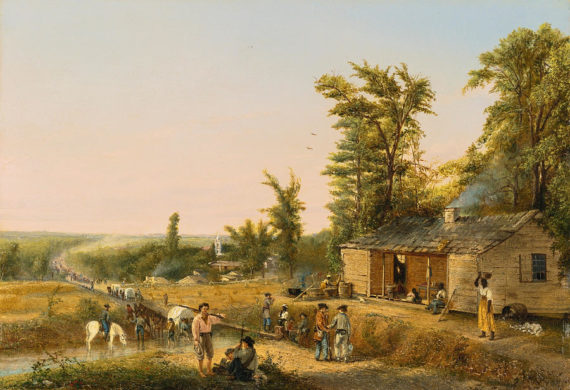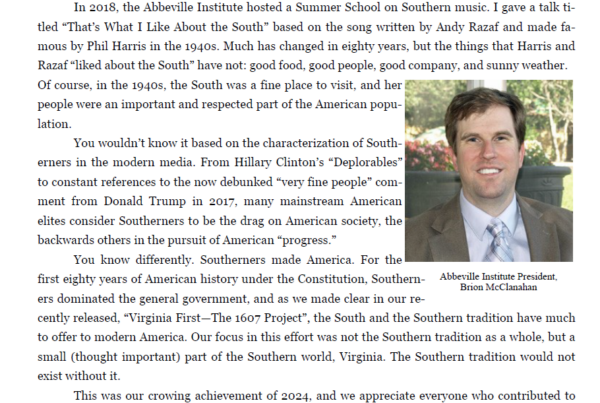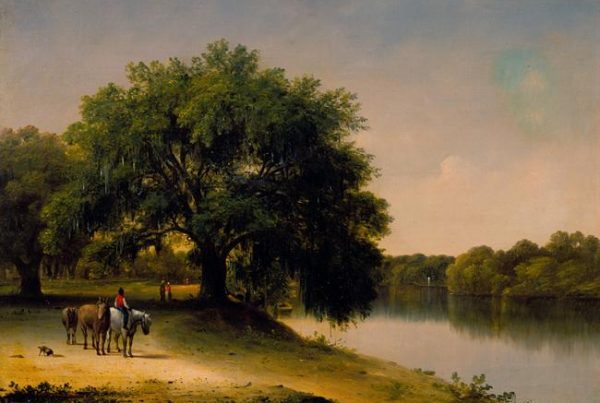A white house sits on the outskirts of a small town in upstate South Carolina. It is modest in both size and appearance, and rather old, and in front of it next to the highway is a large cross which appears to have taken some money and effort to erect. There is a sign which invites any passerby to stop and kneel at the cross to pray, particularly for the good of the nation. This house is remarkable for the contrast it presents to so many other houses in these parts. Many a house sits guarded by a gate and fence, dogs, and a platoon of signs bearing the stern warnings of NO TRESPASSING, KEEP OUT, BEWARE OF DOG, and the like. In many cases this makes for a real eyesore, but, more importantly, it suggests something about the attitudes of the householders in question, as does the former householder’s cross.
That first man so values the things of the spirit that he has turned his modest estate into a public sanctuary where men might come and humble themselves to beseech God’s favor upon the country. He invites strangers to his own property to participate in a means of grace for their good and that of the wider society of which they are a part. So many others, by contrast, clearly wish to be left alone, and have sacrificed all good taste in advertising their miserliness to the public. Where our example welcomes others and seeks to use his property for their spiritual good, so many other people exclude others, often with threats – think of those signs that say trespassers will be shot – and wish to have nothing to do with them.
It is, admittedly, not pristinely polite to make public comments upon the property and character of others, and one can think of many factors that might mitigate the apparent character of the sundry householders in question. That first property owner may be a hypocrite who does his deeds to be seen by others, à la the Pharisees of old (Matthew 23:5), while many of those others may be otherwise just and neighborly, their signs and barriers erected because of persistent problems with thieves or something like that. Still, as the people in question have purposefully placed their respective signs to express their wishes to passerby, and as passerby can only act and think in light of what they do know, not what they don’t know, it seems a fair comment to say that these different signs represent different approaches to God and neighbor. Of the two it can little bit doubted which is more beneficial and proper; but alas, neither can it be doubted which is the more likely to be obeyed by the public: appearances suggest that the invitation to pray goes unanswered, while those to stay away are readily obeyed.
It is a sad thing that the second way of relating to others – or rather, of not relating to them – is far more common, and that it seems to become more so by the day. Hospitality and neighborliness were once the crowning glories of Southerners. There’s an amusing little remark in B. A. Botkin’s Treasury of Southern Folklore that says the typical response in yesteryear when a stranger knocked on the door was ‘Howdy stranger! What’ll you take?’ The notion that one would greet a stranger with a drink on the porch is pretty well inconceivable today. It seems to have gone the way of student school bus drivers, medieval-style tournaments, eating possum, and quite a lot of other past features of southern life. Being greeted by a shotgun or pistol pointed at one’s face and told to ‘git’ or receiving an ugly berating seems, however, rather probable.
What has happened that a people who was once conspicuous for its magnanimity and general amiability towards strangers has come to so fear them and to so disdain their company that people resort to fortifying their properties and loudly advertising their orneriness to the world? Are ‘Jehovah’s Witnesses’ and Mormon missionaries and other proselytizers really that much of a nuisance? Are thieves so much to be feared? Do we not bear arms? Is not the general knowledge of that fact deterrent enough to the criminal element? Perhaps you will say that much of this is meant as a defense against civil liability. Very well; but should a man fear being sued more than the far more likely consequence of being a bad neighbor by isolating himself from others?
Now you might say that a man has every right to cut himself off from the wider world and to enjoy unbroken privacy and peace in his home. Perhaps; but “to have a right to do a thing is not at all the same as to be right in doing it” (G.K. Chesterton). From the standpoint of the law a man has every right to drink a half gallon of liquor daily, to ride a burro down a four-lane highway during rush hour, or to read grotesque, pornographic literature. But no one can seriously maintain that any such action is either prudent or just. It is a right only in the legal sense, because we have deemed it a far greater danger for the state to criminalize and punish such behaviors than to tolerate them. In a deeper, that is a moral or spiritual sense, such behaviors are fair game for criticism as harmful to one’s good and that of others.
So also with this question of isolating oneself from others. It may be a legal right, but that does not mean it is either wise or righteous. It is, in fact, the mark of a bad man that he is a misanthrope who disdains charity towards strangers and neighbors. Indeed, this habit has gone a long way towards cheapening the notions of neighbor and community. The former now means simply ‘one who lives nearby.’ But there was a time when it included the further element of ‘and towards whom I have certain social and civil obligations.’ The latter concept now has an almost wholly commercial or, shall we say, real estate character: a community is simply a place where people live and do business. In its fuller sense it carries with it the ideas of common heritage and culture, shared history, and a peculiar character that distinguishes a place and its residents from others. Take the personal element of acquaintance out because people no longer know their neighbors, and all that is left is the commercial side of it: people deal with each other in business circumstances, but not much otherwise.
But to return to the question, what was it that caused all of this change in attitude from one of hospitality to one of hostility? A fear of crime probably has a part, though it is a poor excuse. Crime was a far graver thing in the era of backwoods bandits and primitive methods of security and detection than now, but people of past times, who knew full well any stranger knocking on the door might be a brigand, seem not, for the most part, to have allowed that knowledge to prevent them from exercising the duties of hospitality. Crime has been falling for about 30 years now and is it about at its pre-1960s level before the spike of that decade and those following; in a wider historical sense it is thought that this level of crime is the lowest in the history of our nation. If it is fear of crime, then, that accounts for the shyness, it is a fear that is greatly exaggerated. The fear of liability has some merit, surely, but it little accounts for large, menacing dogs and things like signs that say visitors are not welcome or that trespassers ought not to expect warning shots. Being sued because your dog bit someone or because you shot someone without legal justification seems more likely than being sued because someone traipsing in your woods tripped and sprained his knee. But even if not, the language of the signage and the nature of the barriers do not suggest that avoiding liability is their primary purpose.
Perhaps we come nearest when we consider avoiding being inconvenienced as the main reason for all of this. Many people today have very high opinions of their own importance; and many people have lives that are already quite busy without someone coming along to interrupt one’s peace with a knock on the door and a religious or business solicitation. One can certainly sympathize with a desire for peace of mind. Yet warding off solicitors is not as sensible a measure as it might seem at first glance. In the first case, personal solicitation is far less frequent than solicitation via junk mail, telemarketing calls, or email spam. Second, it is rather more easily countered, for you can tell a door-to-door salesman in a polite but firm tone ‘No, thank you’ in such a way that he understands he need not bother coming by again. You could probably ward off ‘Jehovah’s Witnesses’ by asking a few pointed questions about the reliability of their New World Translation and the manner in which it was translated. Third, in deterring solicitors by signs, dogs, barriers, etc. one deters all people, including people whom one ought not to deter, such as passerby in need of aid or neighbors.
Now lying at the root of all of this there is, one suspects, a base cause that animates an inordinate fear of crime, of lawsuits, and of being inconvenienced. Is it not simply this, that men put their own desires and pleasure ahead of the good of others, and of their duties toward them? Is it not that privacy and possessions are esteemed more highly than other people and their needs or company? Is it not that our society has shifted from one with traditional pursuits such as agriculture towards one which is industrial/commercial, and, accordingly, from relative poverty to one in which material prosperity is both common and esteemed more than anything else whatever, especially more than traditional virtues (as courtesy, hospitality, general neighborliness) and a robust sense of community? It is hard to escape the conclusion that the answer to all these questions is ‘yes.’ As the sundry polities of the South see their populations grow and their economies change rapidly because of the large influx of people from other states, it seems they lose their traditional values, manners, and customs and adopt, at least in part, new ones that are tempered by a materialistic and consumeristic ethos that imagines the great things in life can be bought and sold, and that they are rather material than spiritual in character. This belief that commerce and consumption are preeminent, and that everything ought to be organized around them has taken its hold in our culture, and its essential greed is inimical to our old ways and fights against them. This appears to occur not only among newcomers and among those who profit from the growth in population and GDP, but even to those whose residence is long-established and whose material position is about the same or even relatively lesser than before the advent of the increased population and wealth. In short, wealth corrupts both those who have it and those who don’t, as we take our values from society as a whole and not only from the class or station which we occupy. Certain elements of Southern culture are surviving in rural areas and even, to some extent, in more suburban ones. But others are not, and a sense of community seems to be one of those things that are dying as the things which enable it decline in the face of wealth and the greed and arrogance it kindles in men’s hearts.
Now it does no good to wax philosophical about all of this and not ask the further question of what practical action can be taken to mitigate it. The answer is simple: do not embody in your own thoughts and conduct those things that are detrimental to the good of your neighbor and to the establishment and maintenance of a robust community, membership in which is desirable and pleasant. Eschew greed, whether the desire for more possessions or a selfish hoarding of what you already have (avarice). Forsake all disdain of others and every notion that your time is too precious to waste with others or that you ought to put your desires ahead of your neighbor’s good. Determine to offer aid when it is requested or appears needed. Aim to be polite and friendly with all who come your way. Get out of your house and out from the numbing influence of screens, as you have more occasion to meet your neighbor if you’re out on your porch or in your yard than if you are forgetting the wider world while watching television. Except where there is a true need for the opposite (e.g. your neighbor is a lunatic who has threatened your life), make your property accessible and deal kindly with anyone who comes to your step, even if their timing is bad or you would rather not deal with them. Risk having a dull conversation or a tool not being returned. Don’t yell at kids if you find them playing in your woods but rather count it a far preferable thing to them sitting at home and becoming fat playing video games.
I bid you take thought of your honor and heritage as a Southerner. To value pleasure and possessions and self more than the exercise of neighborly virtue and community is, to be quite blunt, a Yankee way of thinking and acting. Yankee, not in the general sense of Northern, but rather in the strict sense of materialistic, arrogant, obnoxious, selfish, cold, uncharitable, and individualistic in the wrong way. Our forefathers styled themselves The Chivalry and conceived of themselves as untitled nobles who were nonetheless obliged to be conspicuous for their magnanimity, graciousness, generosity, courtesy, and affability, all the more so as others (especially Northerners) succumbed to materialistic, industrial, and democratic excesses that corrupted individual character. They did not perfectly attain to ancient Greco-Roman, medieval/chivalric, or Christian ideals of behavior, nor shall we. But we, being their heirs, ought to make the effort in the hope that, like them, we will meet with great (if not absolute) success. Doing so means doing as suggested above and repenting past, mistaken ways of acting and thinking. Dare we dishonor our forefathers or rob our posterity by failing to heed this summons? We owe it to such past and future kin to do so, so let us all endeavor to be rather like that little householder who desires the good of the neighbor and welcomes him rather than like a curmudgeon whose disdain of others is to his own detriment and that of our society.







